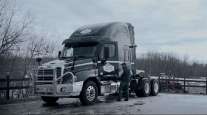Staff Reporter
Canada Announces Final ELD Mandate to Take Effect in 2021

[Stay on top of transportation news: Get TTNews in your inbox.]
The third-party certification requirement included in Canada’s recently unveiled electronic logging device mandate has the potential to “level the playing field” for fleets that engage in cross-border operations, according to Commercial Vehicle Safety Alliance Executive Director Collin Mooney.

Mooney
Canada’s mandate, which was announced June 13 and will take effect in June 2021, includes a proviso that ELDs must be certified by a third-party group. This requirement differs from U.S. regulations, under which ELD vendors self-certify that their device is compliant with technical specifications and registered with the Federal Motor Carrier Safety Administration. In May, FMCSA Administrator Ray Martinez said there are 370 different self-certified ELDs from 247 manufacturers.
The third-party certification policy means that U.S.-based carriers who travel into Canada will need to have a Canadian-certified ELD. If an ELD manufacturer in the United States does not want to go through the certification process, then the carrier using that manufacturer’s devices will need to switch to a different vendor.
“Having a certified program is awesome,” Mooney said. “We think that’s going to have a tremendous impact on all cross-border operations in a good way.”
It’s likely too early to tell how big an adjustment the third-party certification policy will be for U.S. carriers who do business in Canada. Daniel Horvath, director of safety policy for American Trucking Associations, pointed out that U.S. carriers that regularly travel into Canada already need an ELD that is capable of switching between U.S. rules and Canadian rules. He posited that third-party certification might require a relatively simple process, such as a software update, instead of a complete device overhaul.
“My assumption would be that that vendor that that carrier is using is somewhat aware of Canadian regulations to be able to have those features so that that vendor would more than likely want to take the steps to complete the third-party certification process,” Horvath said.
Andy Oleson, a solutions engineer at Platform Science, said the adjustment probably will not be too dramatic for fleets that frequently shuttle back and forth between the countries and use an ELD system that is compliant with regulations on both sides of the border. Platform Science is a technology company that specializes in transportation and logistics.
“I really think it depends on the architecture of the ELD provider,” Oleson said. “I think, at the end of the day, what’s going to be really important for any fleet is to make sure that all of their hours-of-service information is easily digestible and available in one spot.”
Jill Snyder, compliance manager at Zonar Systems, said fleets operating in the United States whose ELDs are not accepted through the Canadian third-party certification system may encounter some challenges. Snyder, who has served on Washington Trucking Associations’ Safety Council board of directors for more than 19 years, said fleets in that situation may have to rely on two ELDs — one for Canadian rules and one for U.S. rules — in the same truck.
“If you have the whole fleet using one ELD, and all of a sudden it can’t be compliant in Canada, that could be a real financial hit,” Snyder said.
Transport Canada, the country’s federal transportation agency, estimates that the ELD requirement will reduce the risk of fatigue-related collisions by 10%.
#ICYMI: Today, Minister Garneau announced actions to mandate the use of electronic logging devices by federally regulated commercial truck and bus operators #RoadSafety #ELDs https://t.co/iiBa7G7QFI pic.twitter.com/AwQYTh87Io — Transport Canada (@Transport_gc) June 13, 2019
The devices also reduce the administrative burdens of maintaining and verifying paper logbooks. Additionally, a press release from Transport Canada notes that these devices are aligned with U.S. road safety regulations, which will foster trade, economic growth and border movement.
“These new mandatory logging devices in commercial vehicles will improve safety for drivers and for all Canadians. Collaboration with stakeholders and partners was key to putting these regulations in place,” Canadian Minister of Transport Marc Garneau said in the press release. “We know that fatigue increases the risks of accidents, and that is why we are taking action across all modes of transportation.”
Canada published its first draft of ELD rules in Part 1 of the Canada Gazette in December 2017, around the same time that the United States’ ELD mandate went into effect. Similar to the U.S. Federal Register, the Gazette is an archive of proposed and official Canadian regulations.




